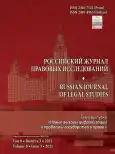The Role of Legal Algorithmic Language in the Identification, Disclosure, and Investigation of Extremist Crimes Committed Through Use of the Internet
- Authors: Bychkov V.V.1, Prorvich V.A.1
-
Affiliations:
- Moscow Academy of the Investigative Committee of the Russian Federation
- Issue: Vol 8, No 3 (2021)
- Pages: 27-40
- Section: Trending topic
- URL: https://journal-vniispk.ru/2410-7522/article/view/76068
- DOI: https://doi.org/10.17816/RJLS76068
- ID: 76068
Cite item
Abstract
For the proper detection, disclosure, and investigation of extremist crimes committed through use of the Internet, it is necessary to create methods for the study of electronic documents and other information contained in systems of various types. At the same time, an important role can be played by information technologies using elements of artificial intelligence, which provide increased capabilities for investigators’ intellectual activities as a result of interaction with them using a legal algorithmic language. Toward this end, it is necessary to create several types of local thesauri and formalize the relationships between the concepts included therein. The features of control over the formation of detailed criminal law characteristics of crimes of the type under consideration, as well as the processing of information in electronic digital form to obtain the necessary evidence, along with their verification and evaluation, are discussed.
Full Text
##article.viewOnOriginalSite##About the authors
Vasily V. Bychkov
Moscow Academy of the Investigative Committee of the Russian Federation
Author for correspondence.
Email: bychkov_vasilij@bk.ru
candidate of legal sciences, associate professor
Russian Federation, MoscowVladimir A. Prorvich
Moscow Academy of the Investigative Committee of the Russian Federation
Email: kse60@mail.ru
doctor of law science, doctor of technical science, professor
Russian Federation, MoscowReferences
- Bychkov VV. Information and telecommunication networks as a means of committing crimes of extremist orientation. Bulletin of the Moscow academy of the Investigative committee of the Russian Federation. 2020;(3):43–46. (In Russ.).
- Bychkov VV, Rotov VA. The concept and types of crimes of extremist orientation committed using information and telecommunication networks. Investigation of crimes: problems and ways to solve them. 2020;(3):26–31. (In Russ.).
- Sokol VY. Crisis of domestic criminalistics. Krasnodar, 2017. 332 p. (In Russ.).
- Volynsky AF. Subject of criminalistics and «scientific separatism»: consequences and possibilities of overcoming them. Proceedings of the academy of management of the Ministry of internal affairs of Russia. 2018;1(45):175–185. (In Russ.).
- Bychkov VV, Prorvich VA. Artificial intelligence in the fight against extremism. Russian journal of legal research. 2020;7(4): 9–18. (In Russ.).
- Volynskij AF, Prorvich VA. Elektronnoe sudoproizvodstvo po prestupleniyam v sfere ekonomiki (nauchno-prakticheskie aspekty). Moscow: Ekonomika, 2019. 364 p. (In Russ.).
- Bychkov VV, Prorvich VA. Features of the formation of algorithms for identifying, disclosing and investigating «high-tech» crimes of an extremist nature committed using the Internet. Russian journal of legal research. 2021;7(1):1–8. (In Russ.).
- Bychkov VV, Prorvich VA. Artificial intelligence in the fight against crimes committed for extremist motives using the internet. Modern criminal procedure law – lessons of history and problems of further reform. 2020;1(2):34–49. (In Russ.).
- Volynskij AF, Prorvich VA. Komp'yuternaya kriminalistika v sisteme ugolovno-pravovoj zashchity «tradicionnoj» i cifrovoj ekonomiki. Moscow: Ekonomika, 2020. 476 p (In Russ.).
Supplementary files







